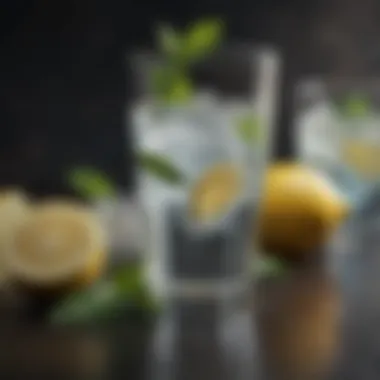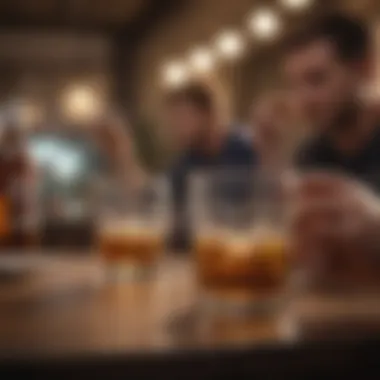Effective Strategies to Prevent Hangovers


Intro
Hangovers represent a complex physiological response to alcohol consumption, characterized by headaches, nausea, and fatigue. Understanding how to prevent hangovers is crucial for maintaining well-being after social gatherings. This article will explore practical strategies that can be integrated into drinking habits to mitigate these adverse effects. Key factors such as hydration, dietary choices, and responsible drinking will be examined in detail, offering a comprehensive understanding of how to enjoy alcohol without enduring the consequences that often follow.
Hydration Strategies
One of the most effective methods to prevent hangovers is proper hydration. Dehydration is a significant contributor to hangover symptoms. Alcohol acts as a diuretic, increasing urine production and leading to fluid loss. To combat this, individuals should embrace a habit of drinking water alongside alcoholic beverages. A general recommendation is to consume one glass of water for every alcoholic drink.
Additionally, electrolyte-rich fluids can help replenish lost minerals. Consider beverages like coconut water or sports drinks that contain sodium and potassium. Consistently hydrating throughout the drinking period can greatly lessen the severity of hangover effects.
Nutritional Choices
Diet plays an essential role in alcohol metabolism. Before engaging in social drinking, a well-balanced meal should be consumed. Foods that are rich in carbohydrates and healthy fats can slow down alcohol absorption. For instance, avocados and nuts are excellent choices that provide good fats while also packing in nutrients.
After drinking, consuming a hearty breakfast with eggs, whole grains, and fruits can assist in recovery. Eggs contain cysteine, which helps break down the toxic byproducts of alcohol. B vitamins and zinc are also effective in reducing hangover severity and can be found in a variety of food sources.
Foods to Include in Your Diet:
- Eggs
- Bananas
- Whole-grain toast
- Nuts and avocados
- Spinach
Responsible Drinking Practices
Adopting responsible drinking habits is fundamental in preventing hangovers. Limiting alcohol intake is effective, but one should also consider the type of alcohol consumed. For example, clear spirits like vodka and gin generally contain fewer congeners, substances often associated with more severe hangovers compared to darker options like whiskey or red wine.
Pacing oneself and alternating alcoholic drinks with non-alcoholic ones can also be beneficial. This strategy helps in regulating alcohol absorption while maintaining hydration. Moreover, knowing one's limits and avoiding binge drinking will further help in reducing the risk of a hangover.
"Moderation is key; it allows individuals to enjoy social interactions without severe repercussions the next day."
Summary
Understanding Hangovers
Hangovers are a prevalent consequence of alcohol consumption, yet many do not fully comprehend the mechanisms behind them. Understanding hangovers is crucial for developing effective prevention strategies. This section unpacks various aspects of hangovers, including their definition, physiological processes, and the symptoms that ensue. By examining these elements, readers can develop insights into how to mitigate the unpleasant aftereffects of a night out.
Definition of a Hangover
A hangover is a collection of physical and mental symptoms that occur after drinking alcohol. The intensity and duration of a hangover can vary widely among individuals. Typically, symptoms manifest when blood alcohol concentration significantly decreases or returns to zero. Common symptoms include headache, fatigue, thirst, and nausea. Defining hangovers precisely helps in identifying their nature and the necessary prevention methods.
Physiological Mechanisms at Play
Several physiological mechanisms contribute to hangovers. The main factors include dehydration, electrolyte imbalance, and the presence of congeners. Alcohol acts as a diuretic, leading to increased urine production, which results in dehydration. This dehydration affects various body functions, including cognition and physical performance.
Electrolyte levels can also drop, compounding symptoms like fatigue and dizziness. Furthermore, congeners—byproducts of fermentation—vary across different types of alcoholic beverages and can exacerbate the hangover experience. Understanding these mechanisms elucidates the why behind hangovers and underscores the relevance of preventive strategies.
Common Symptoms and Their Causes
The symptoms of a hangover can be diverse, with each link generally rooted in the earlier discussed mechanisms. Common symptoms include:
- Headaches: Often caused by dehydration and the expansion of blood vessels.
- Nausea: Stemming from alcohol's effect on the stomach lining and its irritating nature.
- Fatigue: Resulting from poor sleep quality and disruption to circadian rhythms.
- Sensitivity to Light and Sound: Tied to neurological disruptions caused by alcohol.
Understanding these symptoms can help in choosing appropriate steps for prevention and recovery.
Hydration Strategies


Hydration plays a critical role in preventing hangovers. Alcohol is a diuretic, which means it causes the body to lose water and minerals when consumed. This can lead to dehydration, a common factor that contributes to the severity of hangover symptoms. Ensuring proper hydration before, during, and after drinking can significantly mitigate these effects. Understanding different strategies for maintaining hydration will enable individuals to enjoy social events more comfortably and reduce post-consumption discomfort.
Importance of Water Intake
Water intake is essential before, during, and after alcohol consumption. Dehydration can intensify symptoms like headache, fatigue, and dizziness. Drinking water helps to maintain fluid balance in the body, aiding in the processing and elimination of alcohol.
- Aim to drink a glass of water for every alcoholic drink consumed.
- Start your evening by drinking water. This sets a good foundation.
- Incorporate water-rich beverages into your social drinking routine. Many fizzy alternatives can assist with hydration without adding too much alcohol content.
Regular water consumption can help individuals manage their alcohol intake better and lessen the chances of feeling unwell the next day.
Electrolyte Replacement
Electrolytes are vital for several bodily functions, including nerve function, muscle contraction, and hydration. Alcohol consumption can disrupt the balance of these essential minerals. Replacing lost electrolytes can enhance recovery and well-being after drinking alcohol. Foods or drinks rich in electrolytes, such as sports drinks or coconut water, can serve a dual purpose.
- Keep electrolyte-rich drinks readily available during social gatherings.
- Consider drinking them in between alcoholic beverages. This mixed approach can help maintain the body's electrolyte balance while enjoying social events.
- Certain foods like bananas, avocados, and leafy greens can also support electrolyte levels and can be incorporated into your pre-drinking and post-drinking meals.
Pre-Drinking Hydration Protocols
Establishing a hydration protocol before drinking can set individuals up for success. This protocol may include both water and electrolyte-rich beverages. Here are some key considerations:
- Hydrate well throughout the day: Drink water consistently leading up to the event.
- Incorporate hydration reminders: Use a timer on a phone to remind to drink water at regular intervals, especially in festive settings where it is easy to forget.
- Start with hydrating foods before drinking: Salads, fruits, and soups can be consumed as part of a pre-drinking meal. This provides both hydration and essential nutrients.
Staying appropriately hydrated before and during drinking activities can significantly reduce the impact of alcohol on the body.
By implementing these hydration strategies, individuals can proactively shield themselves against the adverse effects of hangovers, leading to a more enjoyable social experience.
Nutritional Considerations
Understanding the role of nutrition plays a crucial part in preventing hangovers. It provides the body with necessary fuel and nutrients that can mitigate the toxic effects of alcohol. This section considers specific foods, vitamins, and minerals that can support the liver and maintain balance in the body.
Foods to Consume Before Drinking
The nutritional choices made before consuming alcohol can significantly influence how the body reacts. Consuming food high in carbohydrates, proteins, and healthy fats is beneficial. These macronutrients act as a buffer against alcohol.
Some effective food options include:
- Whole grains: Foods like brown rice and whole grain bread provide complex carbohydrates that slow the absorption of alcohol into the bloodstream.
- Lean proteins: Eggs and chicken provide essential amino acids, which help the body metabolize alcohol.
- Foods rich in healthy fats: Avocados and nuts are helpful because they help lubricate the gut and slow digestion, reducing the impact of alcohol.
In addition, fiber-rich vegetables and fruits can aid in digestion and promote overall gut health. Foods like bananas can replenish potassium, which may be lost when drinking.
Supplementing with Vitamins and Minerals
Vitamins and minerals have far-reaching implications for health and recovery from drinking. Specific vitamins, such as B-complex vitamins, can be particularly effective. They aid in metabolism and help break down alcohol more effectively.
Consider these supplements:
- Vitamin B1 (Thiamine): Important for alcohol metabolism.
- Vitamin B6: Assists in metabolizing alcohol and reducing hangover symptoms.
- Vitamin C: It promotes liver health, combating oxidative stress.
Additionally, magnesium and zinc are important minerals that support the immune response and can replenish lost nutrients during drinking. Taking these supplements ahead of time may provide added support.
Avoiding Certain Foods and Beverages
Not all food options are beneficial when drinking. Certain foods can exacerbate the effects of alcohol, leading to heightened hangover symptoms. It’s wise to avoid:


- High-sugar foods: They can spike blood sugar followed by a sharp drop, worsening hangover effects.
- Greasy food: While often perceived as beneficial in soakng up alcohol, these can lead to increased digestion issues and stomach discomfort.
- Dark colored drinks: They typically have higher congeners, which can intensify hangovers.
Avoiding certain beverages, especially sugary cocktails, can help minimize adverse effects. In the end, sound nutritional strategies can make a substantial difference in how one feels after a night of drinking.
Alcohol Choices
The choices people make regarding alcohol consumption can significantly influence the likelihood and severity of hangovers. Understanding how different types of alcohol affect the body is essential for anyone aiming to minimize hangover symptoms. Selecting the right beverages can facilitate a more enjoyable social experience while potentially reducing the risk of unpleasant aftereffects. This guide breaks down critical aspects related to alcohol choices, emphasizing their role in hangover prevention.
Understanding Different Types of Alcohol
There are myriad types of alcohol available, each with distinct properties that can affect the body differently. The fundamental difference lies in the fermentation process and the raw ingredients used in production. For instance, spirits like vodka and gin are distilled, leading to a higher alcohol concentration, whereas wines and beers undergo fermentation processes that usually yield lower alcohol levels.
Another critical consideration involves congeners. Congeners are compounds produced during fermentation that contribute to the flavor and aroma of alcoholic drinks. They can also intensify hangover symptoms. Darker drinks, like red wine and whiskey, tend to have higher levels of congeners compared to lighter options like vodka and white wine.
When selecting alcoholic beverages, it is important to slow down and consider these factors. Many drinkers prioritize taste but fail to acknowledge how their choice impacts their health the following day. A more informed approach could lead to better experiences both during and after consumption.
Choosing Low Congener Drinks
Opting for low congener drinks is a strategic way to lessen the hangover's debilitating effects. Lighter-colored options typically contain fewer congeners. For example, vodka and gin rank low on the congener scale, making them more suitable choices for those looking to mitigate hangover symptoms.
Some studies suggest that individuals who consume higher-congener beverages experience more severe hangovers. To maximize enjoyment while minimizing adverse effects, consider the following tips when making alcohol choices:
- Select clear spirits: Vodka, gin, and white rum usually contain fewer congeners.
- Avoid dark spirits: Drinks like bourbon and dark rum have higher concentrations of congeners.
- Opt for quality over quantity: Higher-quality brands sometimes have fewer congeners due to the distillation and filtering processes used.
"Selecting your drink wisely can significantly impact how you feel the next day."
Drinking Practices
Alcohol consumption behavior directly impacts the likelihood of experiencing a hangover. Understanding effective drinking practices serves as a preventive measure in mitigating symptoms associated with hangovers. This section will detail crucial practices that facilitate responsible drinking, making social engagements pleasurable while reducing adverse aftereffects. Implementing these strategies not only enhances your wellbeing during and after social events but also fosters a mindful approach to alcohol consumption.
Pacing Alcohol Consumption
The speed at which alcohol is consumed plays a significant role in determining the severity of a hangover. Rapid consumption increases blood alcohol concentration (BAC), overwhelms the body's ability to metabolize alcohol, and leads to dehydration and toxicity. A guideline to follow is to limit oneself to one standard drink per hour.
By pacing your alcohol consumption, you allow your body time to process the alcohol efficiently. This method can help in preserving cognitive function and physical coordination throughout social interactions.
Alternating Alcohol with Non-Alcoholic Beverages
Another effective strategy is to alternate alcoholic drinks with non-alcoholic options, such as water or soda. This practice serves multiple purposes. Firstly, it hydrates the body, which can counteract the dehydrating effects of alcohol. Secondly, it encourages moderation since it extends the duration of the drinking session while minimizing the quantity of alcohol consumed.
For example, you might take a sip of water after each alcoholic beverage. This simple act can significantly lower the risk of developing a hangover.
Setting Personal Limits
Setting personal limits before engaging in drinking activities is crucial. Knowing your threshold for alcohol intake can assist in maintaining a level of control. This can be based on your body weight, personal tolerance, and prior experiences with alcohol.
Consider the following points when establishing your limits:
- Define a clear maximum of drinks for the occasion.
- Document your intake to remain aware on the night.
- Communicate your limits to friends, creating a supportive environment.
By setting and respecting your boundaries, you can navigate social situations more safely. This practice reinforces responsible drinking habits and reduces the chance of overindulgence.
Post-Drinking Recovery


Post-drinking recovery is crucial for anyone who has consumed alcohol. This phase is not only about alleviating hangover symptoms but also about restoring balance to the body after its exposure to the toxins in alcohol. Understanding how to recover effectively can significantly influence overall well-being and future drinking experiences. In this section, we will explore effective morning-after remedies and the essential role of sleep and rest in the recovery process.
Effective Morning After Remedies
Morning after remedies are strategies people utilize to mitigate the effects of a hangover. These remedies can help minimize discomfort and restore hydration and nutrient levels. Here are some methods:
- Hydration: Drinking water immediately after waking up is essential. It helps combat dehydration caused by alcohol consumption. Adding electrolyte solutions, like those found in sports drinks, might also be beneficial.
- Eating Nutrient-Rich Foods: Consuming nutrient-dense foods can support recovery. Bananas, for instance, can replenish lost potassium, while eggs provide cysteine, which helps break down the byproduct of alcohol metabolism.
- Ginger Tea: Ginger is known for its anti-nausea properties. Sipping ginger tea can ease stomach discomfort, which often accompanies a hangover.
- Anti-Inflammatory Supplements: Non-steroidal anti-inflammatory drugs, like ibuprofen, can help reduce headache and body aches, but should be taken with caution to avoid gastrointestinal irritation.
Implementing these remedies can significantly reduce the time spent feeling unwell after a night out. It is best to adapt methods that work for individual needs and responses to alcohol.
Role of Sleep and Rest
Sleep plays a vital role in recovery after alcohol consumption. Alcohol can disrupt sleep patterns, leading to poor-quality rest, which exacerbates hangover symptoms. Here are some points to consider:
- Restorative Sleep: Quality sleep is essential for bodily recovery. During sleep, the body repairs itself, and many metabolic processes occur at an accelerated rate. This is crucial after the stress of alcohol consumption.
- Sleep and Mood Regulation: Lack of sleep can contribute to mood disturbances, which are often magnified during hangovers. Ensuring adequate rest can help stabilize mood and promote a sense of well-being after drinking.
- Napping as a Option: If sleep is disrupted post-drinking, short naps in the day can be advantageous. Napping, when done correctly, can enhance mood and cognitive functions, making recovery more comfortable.
Resting adequately after drinking helps the body recover efficiently. Prioritizing sleep can lead to a smoother transition back into daily activities and reduce the long-term effects of alcohol consumption.
"Effective post-drinking recovery not only alleviates hangover symptoms but also promotes long-term health and well-being."
By addressing both immediate remedies and the importance of sleep, one can approach post-drinking recovery with a holistic perspective. Implementing these strategies can lead to improved outcomes and a more responsible relationship with alcohol.
Myths and Misconceptions
Understanding hangovers involves sifting through a number of myths and misconceptions that can shape behavior and expectations around alcohol consumption. It is essential to debunk these myths for a clearer understanding of how to effectively prevent hangovers. Misrepresentations can lead to poor choices and ineffective strategies, which may exacerbate the consequences of drinking rather than mitigate them.
Common Misunderstandings about Hangover Prevention
One prevalent misunderstanding is that certain foods can completely prevent hangovers. While eating before or during alcohol consumption can help slow the absorption of alcohol, it does not guarantee immunity from hangovers. Foods rich in healthy fats or carbohydrates may offer some protection, but they are not foolproof. The body's reaction to alcohol is complex, and simply consuming food does not negate the effects of excessive drinking.
Another myth is the belief that some types of alcohol are less likely to cause hangovers. Many assume that clear spirits such as vodka produce fewer hangovers compared to darker drinks like whiskey or red wine. However, the key factor impacting hangover severity is not just the type of alcohol, but the congener content as well. Congeners are byproducts of fermentation and can vary widely among different alcoholic beverages. For example, while vodka may have fewer congeners, excessive consumption of any alcohol can lead to a hangover.
Additionally, people often believe that drinking water will completely eliminate the risk of a hangover. Hydration is undeniably important, but it cannot counteract the effects of heavy drinking entirely. It can help to replenish fluids lost during alcohol metabolism but cannot reverse the alcohol-related damage that may occur.
Debunking Popular Hangover Cures
Several popular hangover remedies are often touted as miracle cures. One such remedy is drinking pickle juice or other sour liquids. While this may provide some electrolytes and perhaps a small degree of hydration, evidence does not support its effectiveness in fully alleviating hangover symptoms.
Another common belief centers around the concept of 'hair of the dog,' which suggests that drinking more alcohol the next day can ease a hangover. This approach can temporarily mask symptoms, but it does not address the physiological causes of the hangover and may lead to a cycle of alcohol dependency and worsen health over time.
Some claim that consuming high doses of vitamins, particularly Vitamin B and C, can cure hangovers. Although these vitamins play essential roles in health, taking large amounts after drinking does not offer relief from a hangover. Instead, a balanced diet and consistent vitamins intake are advisable for overall health.
Finally, the widespread notion that coffee can reverse hangover effects is misleading. While coffee might temporarily boost alertness due to its caffeine content, it can further dehydrate the body, thus intensifying hangover symptoms.
In summary, addressing myths and misconceptions surrounding hangovers can greatly improve preventive strategies. Recognizing the limitations of various remedies and understanding the true nature of hangovers empowers individuals to make informed choices about alcohol consumption, ultimately enhancing well-being and reducing the likelihood of hangovers.
Ending
Summarizing Effective Prevention Techniques
Effective prevention techniques encompass a myriad of approaches. First, proper hydration cannot be overstated. Consuming adequate fluids, particularly water and electrolyte-rich beverages like coconut water, can significantly mitigate the dehydration effects after drinking alcohol. Nutritional choices also play a pivotal role. Eating a balanced meal that includes healthy fats, proteins, and carbohydrates before drinking can help slow alcohol absorption and minimize its intoxicating effects.
Furthermore, understanding what types of alcohol to select is essential. Opting for clear spirits such as vodka or gin over darker options can reduce the risk associated with congeners, which are known to exacerbate hangover symptoms. Imparting knowledge of pacing one's alcohol consumption, such as taking breaks and drinking slowly, is vital to maintain control over intake.
Encouraging Responsible Drinking Practices
Responsible drinking practices extend beyond just the immediate prevention strategies identified. It involves a holistic approach to social drinking. Setting personal limits on alcohol intake before engaging in social gatherings can lead to more mindful consumption, while alternating between alcoholic and non-alcoholic beverages can also help maintain moderation.
Moreover, fostering an environment where one feels comfortable declining additional drinks is crucial. This not only protects individual health but may also influence peers to engage in healthier drinking habits. Overall, emphasizing the importance of balance, moderation, and awareness of one’s own limits can contribute significantly to reducing the risk of hangovers. These practices collectively enhance overall well-being, reinforcing a culture of responsibility when it comes to alcohol consumption.







